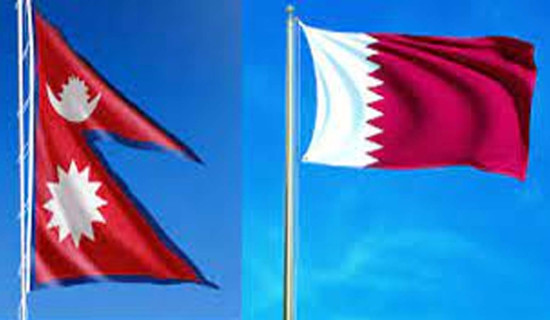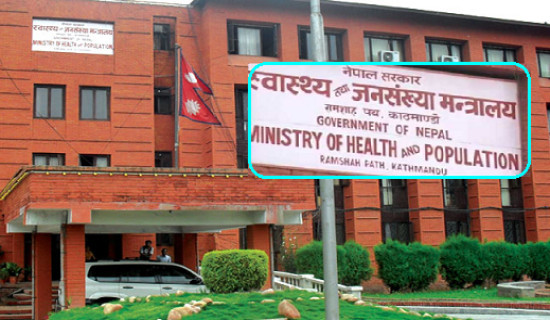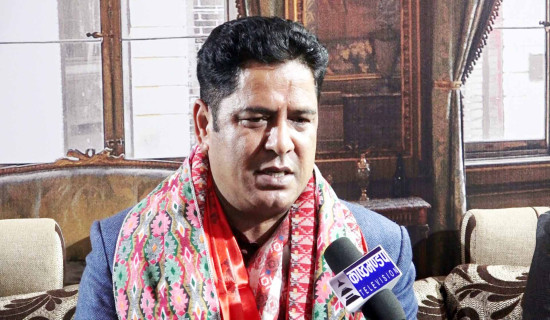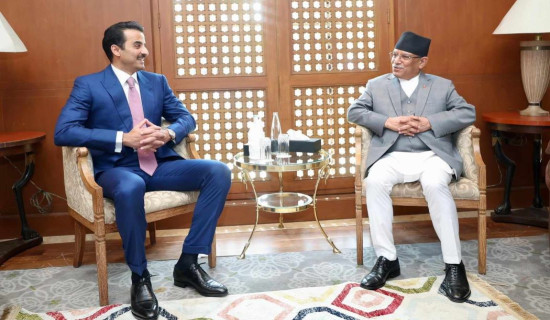- Wednesday, 24 April 2024
Reflections Of A Diplomat
Niraj Lwoju
The major significance of the recently launched book 'Kutnitik Dairy' (Diplomatic Dairy) by Rajeshwor Acharya, former Nepali Ambassador to China is it was brought forth for the sake of readers. Otherwise, hundreds of diplomats who served various friendly nations representing Nepal had not even written a single page to decipher their experiences and achievements among Nepali people.
Certainly, an ambassadorial post is a public office and envoys reflections during their tenure are a public concern matter. The events and activities they did as ambassadors are in one way or another related to the present and future of the nation. Some of such writings can even change the established truth and make us rethink certain periods and events.
So, writing books or reading materials by diplomats is crucial for a thorough understanding of the foreign policy and position of the nation. But only a handful of Nepali diplomats hitherto had written books and shared their experiences publicly. Hence, writer Acharya must be appreciated for his perseverance to revisit his dense past and come with a bulk of the book recollecting his reflections.
Acharya served as Nepali ambassador to the PR of China from 1998-2003. It was a period full of vicissitudes and turmoil in Nepali politics. The Maoist Civil war was ravaging. The Nepali economy was eroding because of political instability and violence. Many aspects of the Maoist rebellion were translucent then.
Maoism as a terminology is derived from the name of the Chinese leader Mao Tse Tung. Hence there was a sort of suspicion upon China was behind the Maoist rebellion in Nepal. The Tragic Royal Palace massacre happened during this time resulting in more political havoc and confusion.
Against such a backdrop, leading the Nepali diplomatic mission to Beijing of course was of high importance. Diplomatic activism in Beijing was equally important for setting trends in Nepali politics. So, the diplomatic tenure of Acharya in Beijing as Nepali ambassador was imperative and hence 'Kutnitik Dairy' authored by Acharya is significant to understand the then condition through different angles.
'Kutnitik Dairy' essentially is a collection of events held during Acharya's tenure as Nepali ambassador to China, North Korea and Mongolia. Nepali Ambassador to China is also delegated authority to deal with North Korea and Mongolia. He moved to Beijing on 17th October 1998 and presented his credential letter to the then-Chinese President Jiang Zemin.
Acharya is an economist a scholar and a professor by profession. Diplomacy for him was a new area of contribution. But his zeal for progression made him work hard and with dedication there. Hence within a short period, his activism was appreciated both in Nepal and China. As an economist, his preference mostly was in economic diplomacy. He insisted on enhancing bilateral relations between China and Nepal for the development of agricultural infrastructure and sustainable agriculture. China is the world's most populous country.
She has many mouths to eat and many bellies to be filled. But particularly after the establishment of the peoples' republic, China made tremendous progress in the agriculture sector. Nepal can learn a lot from Chinese success, particularly in agricultural technology. Acharya during his stay in Beijing, as an ambassador, prioritized mutual learning in agriculture.
But his insistence on economic diplomacy is not the humble word for 'begging' diplomacy. Rather he opined for a diplomacy based on a bilateral win-win policy where both parties could boost their well beings. 'Merely begging won't keep our dignity high', he advised Nepali political leaders.
In ' Kutnitik Dairy' Acharya has put light on various such day-to-day issues about which ordinary people hardly know but reform in such areas is pivotal for the smooth running of Nepali diplomacy. It's interesting to read that the Nepali embassy in Beijing had even no internet facility when Acharya arrived there. All furniture in Embassy was old-style. He started his work by reforming such lacking.
His insistence on appointing a joint secretary-level government official instead of an under-secretary in a Beijing-based embassy eased diplomatic dealing with the Chinese government and daily office running.
Acharya, in his book, wrote his account of the separate high-level visits of King Birendra and King Gyanendra. The writer seems impressed by King Birendra's modest behaviour and humble dealing. King Birendra visited China multiple times so he was well-informed about the conditions of China. Chinese leaders also seem easy and close to dealing with the then Royal family.
Also an ambassador of Mongolia, Acharya sounds sorry for not being successful to hold King Gyanendra's declared visit there. He insisted on learning from Mongolia which itself is a landlocked nation between Russia and China like Nepal.
Beyond his activities as an ambassador, in the book, a section is written on his account too. It put light on the political background and activism of Acharya. He was an active cadre of the Nepali Congress and was a founder leader of the Nepal Students' Union, a student wing of the Nepal Congress. His proximity with Nepali Congress leaders such as BP Koirala, and Girija Prasad Koirala gave him chances even to advise them on various issues. He was appointed to sundry state mechanisms as an adviser or an executive officer.
The book with a good collection of photographs is interesting, informative and worth reading. But the repetition of certain issues on multiple pages and the incongruity of issues made the reading uneasy to some extent. Language could have been more polished had there been fine editing.
Readers could expect some elaborative discussions on certain issues that had been briefly talked about. The political, social and economic condition of then China and its leadership should have been discussed in detail.
A major part of the book is covered by the list of bilateral exchanges and visits between China and Nepal. It would have been more informative had there been an analysis and achievements of such visits. Hundreds of Nepali delegations visit China annually. But mostly such visits are constrained to wandering with meagre achievements, resulting in a wastage of sources and time.
'Kitnitik Dairy' could be useful reading material for government officials in foreign affairs. They can get a list of general matters to be resolved in Nepali diplomatic missions to various countries. It could be readable even to students and researchers of international relations and politics.
Readers can find out the major concerns of China towards Nepal. Historians can be benefitted from the book equally.
Thanks to Ambassador Acharya who have for added important reading stuff to the worthy collection of diplomacy that Nepal lacks.
nlawoju@gmail.com
How did you feel after reading this news?















-original-thumb.jpg)
